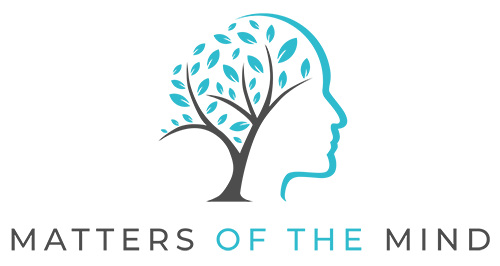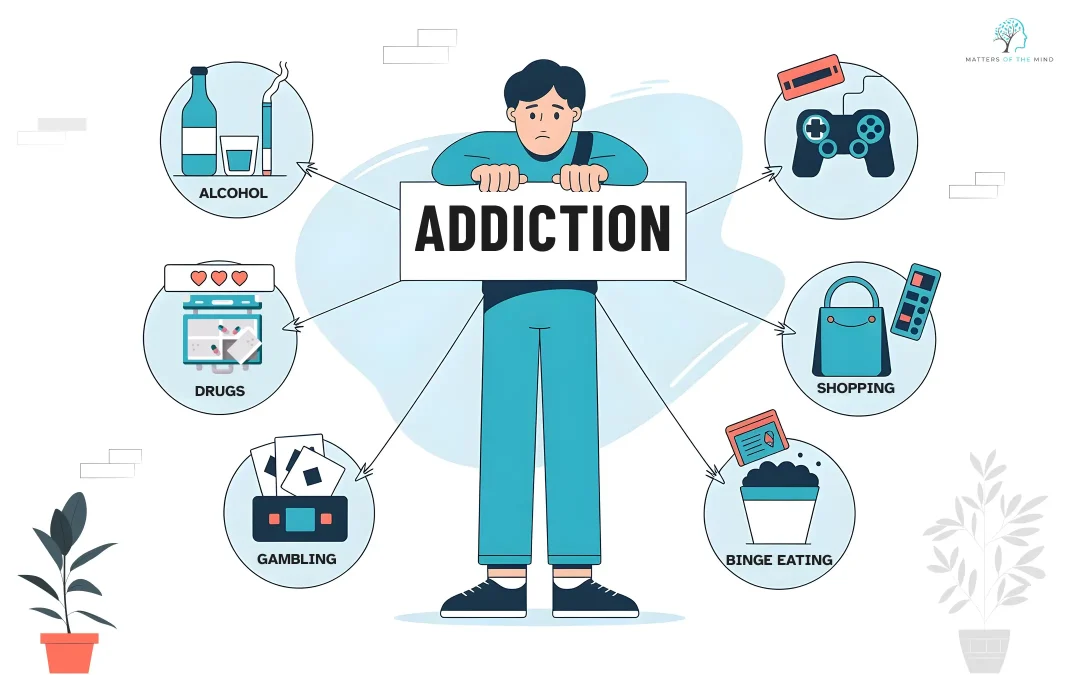Addiction is a complex condition that affects not only the individual but their families, relationships and overall mental and physical well-being. It’s often viewed as a means of substance abuse, but addiction can take many forms, some of which are seriously harmful. Whether it’s a dependency on substances, screens or certain behaviours, addiction can quietly disrupt an individual’s life and disconnect them from people.
Let’s discuss what addiction actually is, the different types, symptoms and the treatment available.
What is Addiction?
Addiction is a chronic psychological condition often identified by compulsive engagement in behaviour or use of substance, despite harmful consequences. It alters the brain’s reward system and leads to a loss of control over one’s choices, often accompanied by intense cravings and withdrawal symptoms when the substance or behaviour is stopped.
While addiction is most commonly associated with drugs and alcohol, it can also involve behaviours such as gambling, internet use, pornography, gaming, shopping and even eating.
Types of Addiction
Addiction can be broadly divided into two categories:
1. Substance addictions
This involves a physical and psychological dependence on chemical substances that alter brain function. Common examples include:
Alcohol: One of the most socially accepted yet widely abused substances, alcohol can lead to dependence that affects memory, mood, liver function, and decision-making.
Nicotine: Found in cigarettes and vaping products, nicotine is highly addictive and stimulates short-term alertness, often followed by long-term dependence and health issues.
Prescription Drugs: Medications like opioids (for pain) or benzodiazepines (for anxiety/sleep) can become addictive when misused.
Illicit Drugs: Substances like heroin, cocaine, and even cannabis can rapidly rewire the brain, create strong cravings and lead to destructive life patterns.
2. Behavioural symptoms
Unlike substances, behavioural addictions don’t involve ingesting chemicals, but they still can hijack the brain’s structure. These behaviours initially offer relief, excitement, or comfort, but over time, the individual begins to lose control, experiencing compulsions and negative consequences.
Common behavioural addictions include:
Gambling: The unpredictability and thrill of winning create intense dopamine spikes, often leading to financial ruin and emotional distress.
Internet or Gaming: Excessive screen time, online games, or social media usage can impair real-world functioning, sleep, focus and emotional regulation.
Shopping or Spending: The short-term high of buying something new can spiral into debt, shame and a cycle of emotional dependence.
Binge eating: Turning to food for discomfort can become a repeated cycle that impacts physical health, body image and emotional stability.
How Addiction Works
At the neurological level, addiction affects the brain reward pathway, causing an individual to continuously want the product. Here is what happens:
- When an addictive substance or behaviour is experienced, dopamine is released in large quantities.
- This surge creates a pleasurable feeling, reinforcing the behaviour.
- Over time, the brain adapts by reducing its natural dopamine production.
- The individual then requires more of the substance or behaviour to achieve the same effect; this is known as tolerance.
- Eventually, the person may engage in the behaviour just to feel normal, not necessarily to feel good.
These changes in brain chemistry are what makes addiction chronic, relapsing and difficult to manage without support.
Causes of Addiction
Below are the common reasons why addiction happens in an individual.
Genetic vulnerability
Family history plays a significant role. Individuals with a genetic predisposition may be more susceptible to addiction.
Mental health conditions
There is a strong correlation between addiction and disorders such as anxiety, depression, PTSD, bipolar disorder, and ADHD. This is known as dual diagnosis, where addiction and mental health feed into one another.
Early trauma or adverse childhood experiences
Unresolved trauma, neglect or abuse in early years significantly increases the risk of developing addiction.
Stress and emotional dysregulation
Many individuals choose substances or behaviours to numb uncomfortable situations like loneliness, guilt or shame.
Social environment
Peer pressure, cultural norms, lack of community, and access to substances can play a major role in developing addiction.
Signs and Symptoms of Addiction
Here are the listed key signs of addiction that you should be aware of:
Behavioural symptoms
- Loss of control over use or behaviour
- Neglecting responsibilities
- Failed attempts at tasks or quit
- Risk-taking behaviours
- Withdrawal from social and recreational activities
Physical symptoms
- Change in sleep and appetite
- Tolerance (needing more to feel the same effect)
- Withdrawal symptoms (eg, anxiety, nausea, irritation)
- Neglected appearance and hygiene
Psychological symptoms
- Cravings
- Obsessive thoughts about the substance or behaviour
- Mood swings, irritability or depression
Treatment options for Addiction
Recovery is not one size fits all. Effective treatment is individualised and often combines multiple therapeutic approaches. Key components include:
Detoxification
For substance-based addictions, detox is often the first step. This involves safely removing the substances from the body under medical supervision.
Psychotherapy
Evidence-based therapies help address the root causes of addiction:
Cognitive behavioural therapy (CBT): Challenges negative thinking and develops healthier coping strategies.
Dialectical behaviour therapy (DBT): Helps with emotional regulation, particularly those with trauma or borderline traits.
Group therapy and peer support
12-step programs like AA, NA or SMART recovery provide community, accountability and shared healing.
Family therapy
Involving family in treatment improves communication, builds a support system, and addresses enabling or codependent dynamics.
Holistic approaches
Incorporating practices like yoga, mindfulness, and exercise supports long-term recovery by healing the body and mind together.
Final Thoughts
Addiction is not a reflection of weakness; it is a condition that affects the brain, body, and behaviour, and it deserves to be treated with compassion, evidence-based care, and understanding. Whether you or someone you care about is facing challenges related to substance use or behavioural patterns, ensure that recovery is possible.
Treatment is not just about stopping the behaviour; it’s about uncovering the deeper emotional, psychological, or situational roots behind it and learning healthier ways to cope and connect with life.
If you’re seeking professional guidance, reach out to Dr Kavita Deepak-Knights, a qualified clinical psychologist based in Windsor, Berkshire, who offers personalised therapeutic support for addiction and mental health challenges.
Book a personalised consultation with Dr Kavita today and take the first step toward mental health.

